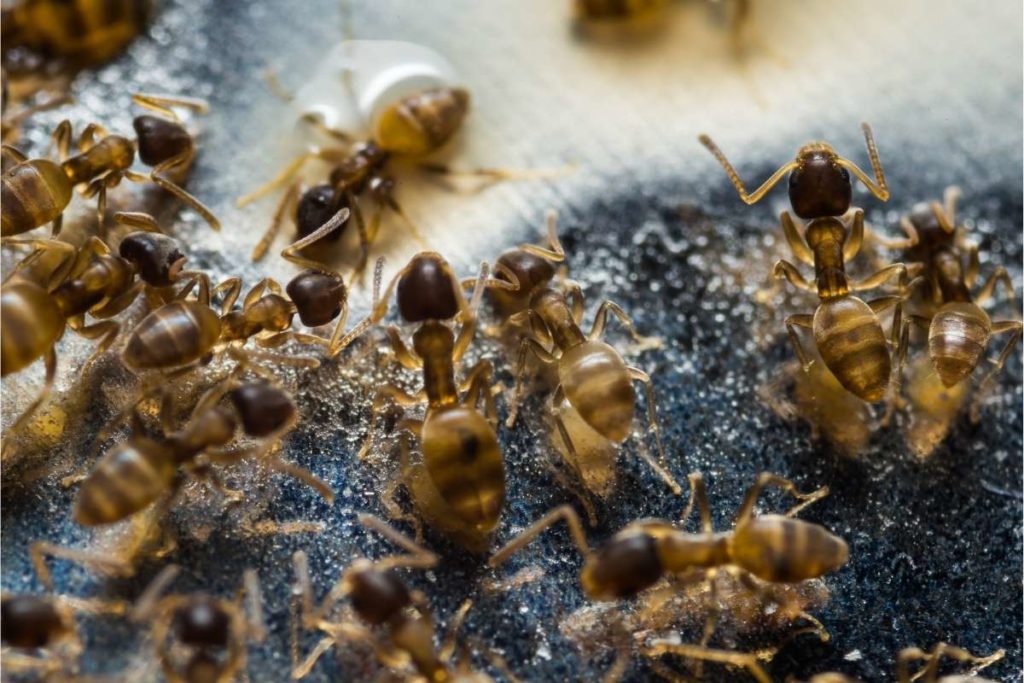Pharaoh Ant Infestation – What To Do
If you think you’ve got a pharaoh ant infestation, be very careful with how you tackle it. Pharaoh ants present unique challenges for homeowners, and DIY treatments can even worsen the problem.
Of course, your first instinct might be to swat the ants and start shopping for insecticides. If your second instinct involves researching pharaoh ant control to find out the most effective way to treat them, you’ve come to the right place. Learning more about these insects helps you keep your home safe and pest-free.

What are Pharaoh Ants?
The pharaoh ant, Monomorium Pharaonus, originates around the Mediterranean, including Southern Europe and North Africa, hence its Egyptian name. It shares the same Formicidae family as native British ants, like the common black/garden ant. However, key differences in its behaviour and biology make it a tricky pest to handle.
Pharoah ants spread around Europe, including the UK, via trade routes of international commerce. A typical hive consists of workers, males, and queens.
If you discover ants in your home, you’re likely to run into the workers. They’re smaller than common ants, at around 2 millimetres, and they’re a sandy yellow-brown colour. The non-worker males span 3 millimetres and appear black, like typical British ants. The queens, however, reach up to 5 millimetres and are dark red. Both males and queens grow wings but remain flightless.
Where Might a Pharaoh Ant Infestation Occur?
Due to their Mediterranean heritage, pharaoh ants struggle to brave the British outdoor elements. They, therefore, prefer indoor spaces, such as residential homes or warm commercial spaces like restaurants or factories. Pharaoh ants require at least 18 degrees Celsius to propagate and prefer an optimum 30 degrees.
Their search for warmth leads them towards heating systems and cooking or manufacturing equipment. This drive adds extra hazard to a pharaoh ant infestation, bringing them into contact with food, water, and even medical supplies. Even when they don’t scare or bite their victims, they spread pathogens and degrade infrastructure, making it more vulnerable to other issues with infestation and disrepair.
Should I Tackle a Pharaoh Ant Infestation by Myself?
For several reasons, the short answer is no.
Firstly, pharaoh ants have multiple queens, unlike the typical one-queen setup among other insects. This multiple-queen structure allows pharaoh ants to populate rapidly and branch off into separate infestations. Typical black ant colonies stretch to 15,000 ants maximum, whereas pharaoh ant hive networks can triple that number, and even reach beyond 50,000.
Their preference for warmth also pushes them deeper into building infrastructure, meaning they often inhabit inaccessible insulation and deep internal cavities.
It’s perfectly understandable to treat a trail of yellow-brown worker ants with spray or an ant trap. However, only 5% to 10% of workers leave the hive to forage. One small trail of ants hints at a large hive working within your building.
Worse still, treatment can trigger a phenomenon called budding, where ants react to threats by splitting their colonies into different areas of the building and multiplying.
The Best Approach for Pharoah Ants
Ant control experts offer the most effective way to approach an infestation. They use strategic, non-lethal baits to identify the size and locations of pharaoh ants, and plan your next steps.
Rather than tackling the problem with lethal toxins, professionals use industry-leading chemicals to bait foods that take the hive down from within. Pharaoh ants prefer sweet foods and raw meats. Ant control experts lace these baits with chemical treatments to curb the infestation by interrupting their lifecycles. These tactics prevent budding, giving you the best chance of solving your pharaoh ant infestation for good.
